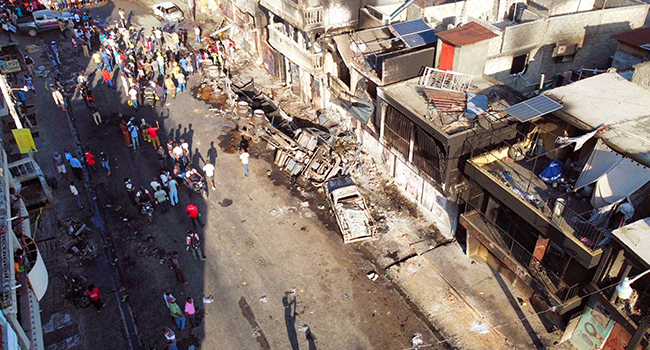
More than 60 people were killed when a fuel truck exploded in a street in Haiti's second-largest city Cap-Haitien during the night, the city mayor said.
As dozens of bodies lay near the explosion site, people in the area used buckets to scoop up fuel from the truck and the street to take back to their homes, Dave Larose, a civil engineer who works in Cap-Haitien, told the Associated Press.
'We have now counted 60 deaths,' Deputy Mayor Patrick Almonor said, adding that authorities were still searching for additional victims amid the charred debris.
Almonor earlier described a horrific scene at the blast site, saying he had seen more than 50 people "burned alive" and that it was "impossible to identify them."
According to Almonor, the truck is believed to have flipped over after the driver lost control while swerving to avoid a motorcycle taxi. 'It's horrible what happened,' he said. 'We lost so many lives.'
Almonor said around 20 houses in the area were also set ablaze by the explosion, but that no details were yet available on possible victim numbers inside the homes.
Fuel spilled onto the road and pedestrians apparently rushed to collect the tanker's gas, which is in short supply as Haiti grapples with a severe fuel shortage caused by the tightening grip of criminal gangs on the capital Port-au-Prince.
The local hospital was stretched trying to treat the injured, Mayor Pierre Yvrose told Reuters. The true total number of injured was still not known. We need human resources, and also material resources, namely, serum, gauze, and anything that can be used in case of serious burns,' Yvrose said.
As rescue workers cleaned up in the aftermath of the explosion, bodies covered in white sheets lay on the ground before they were loaded on to trucks to be taken away. The United Nations office in Haiti said it stood ready to help the national authorities in its response, and offered its condolences to the families of the victims.
The Caribbean nation has suffered from a wave of violence this year by gangs who for nearly a month prevented fuel trucks from loading at its main fuel ports, forcing many businesses to shut down. Fuel deliveries resumed last month.
Gangs have grown more powerful since the July assassination of President Jovenel Moise, which created a political vacuum and allowed criminal groups to expand their territory.
The Caribbean nation has never produced enough electricity to meet the needs of the whole population. Even in well-off parts of the capital, the state-run Haiti electric utility only provides, at most, a few hours of power a day.
Those who can afford it rely on pricey generators, which are no help in the face of the severe fuel shortage caused by gangs blocking access to the country's oil terminals in the capital and its outskirts.
In recent months more than a dozen vehicles transporting fuel have been attacked by gangs demanding ransoms for the drivers' release. Demonstrators took the streets as recently as Monday protesting the increase of the resulting rise in gasoline prices.
The lack of fuel is also damming up water access, in a country where many people rely on private companies to deliver water by truck to at-home systems. And with no guarantee of steady power or water supply, health care providers have been forced to drastically cut back their services.